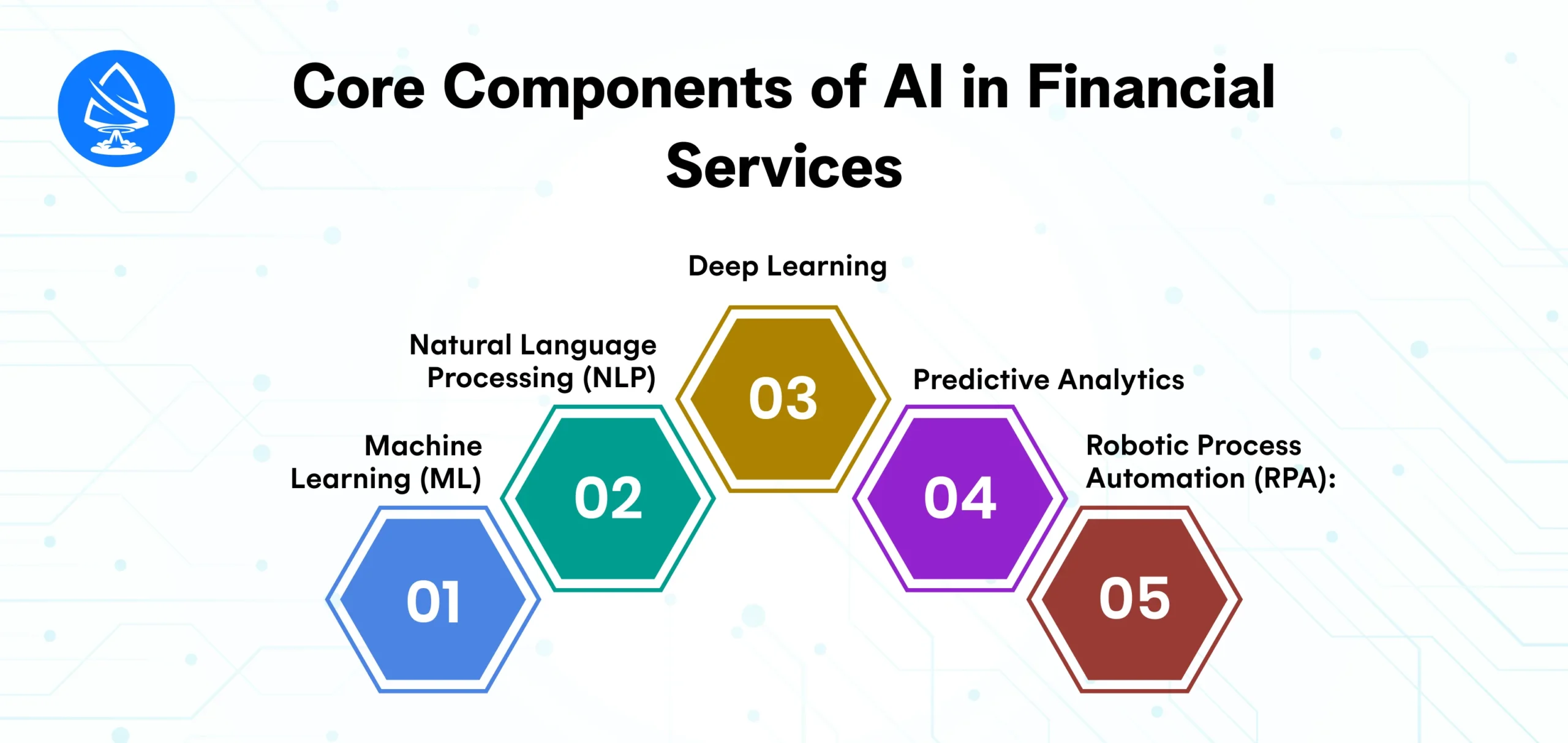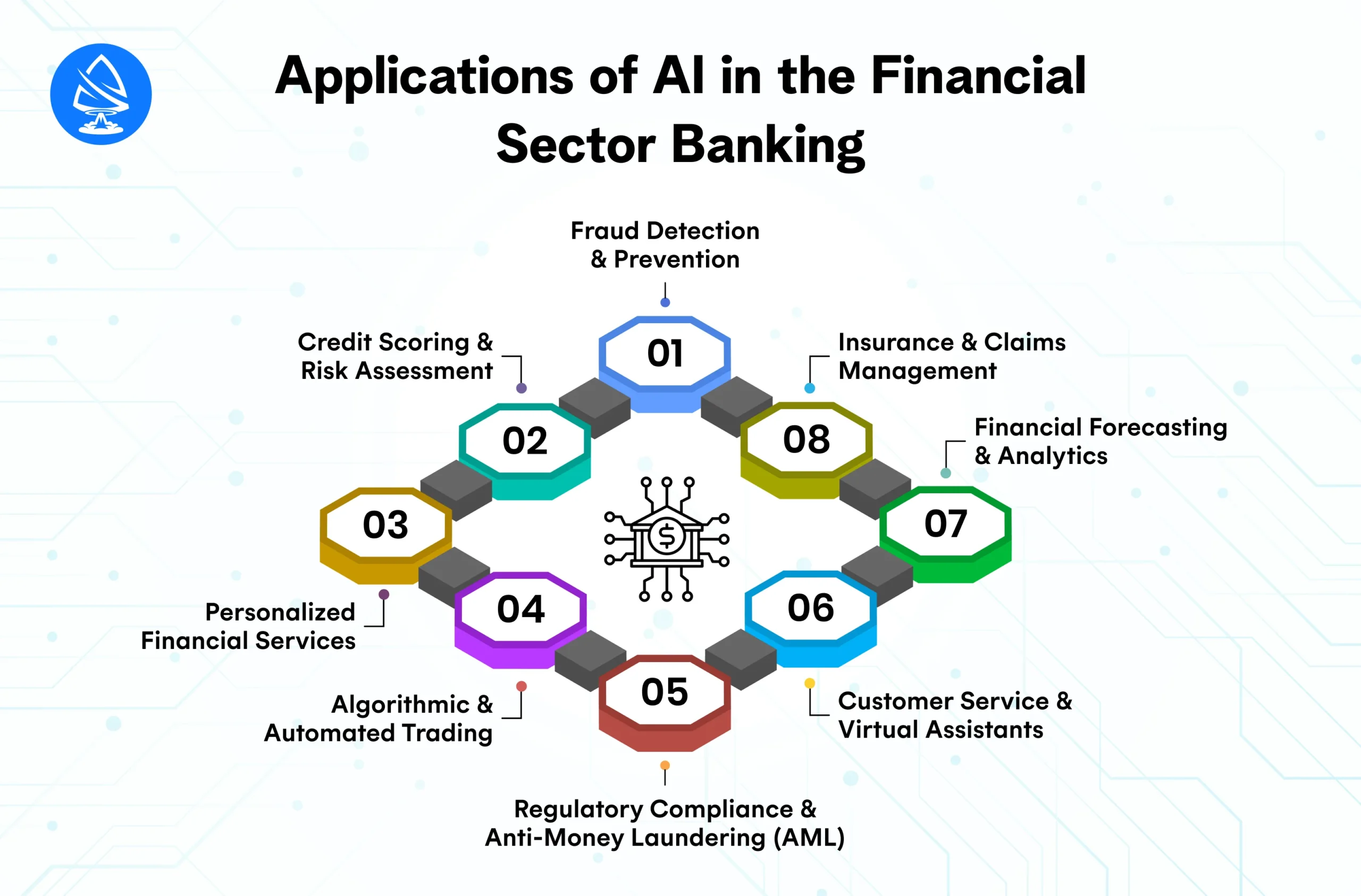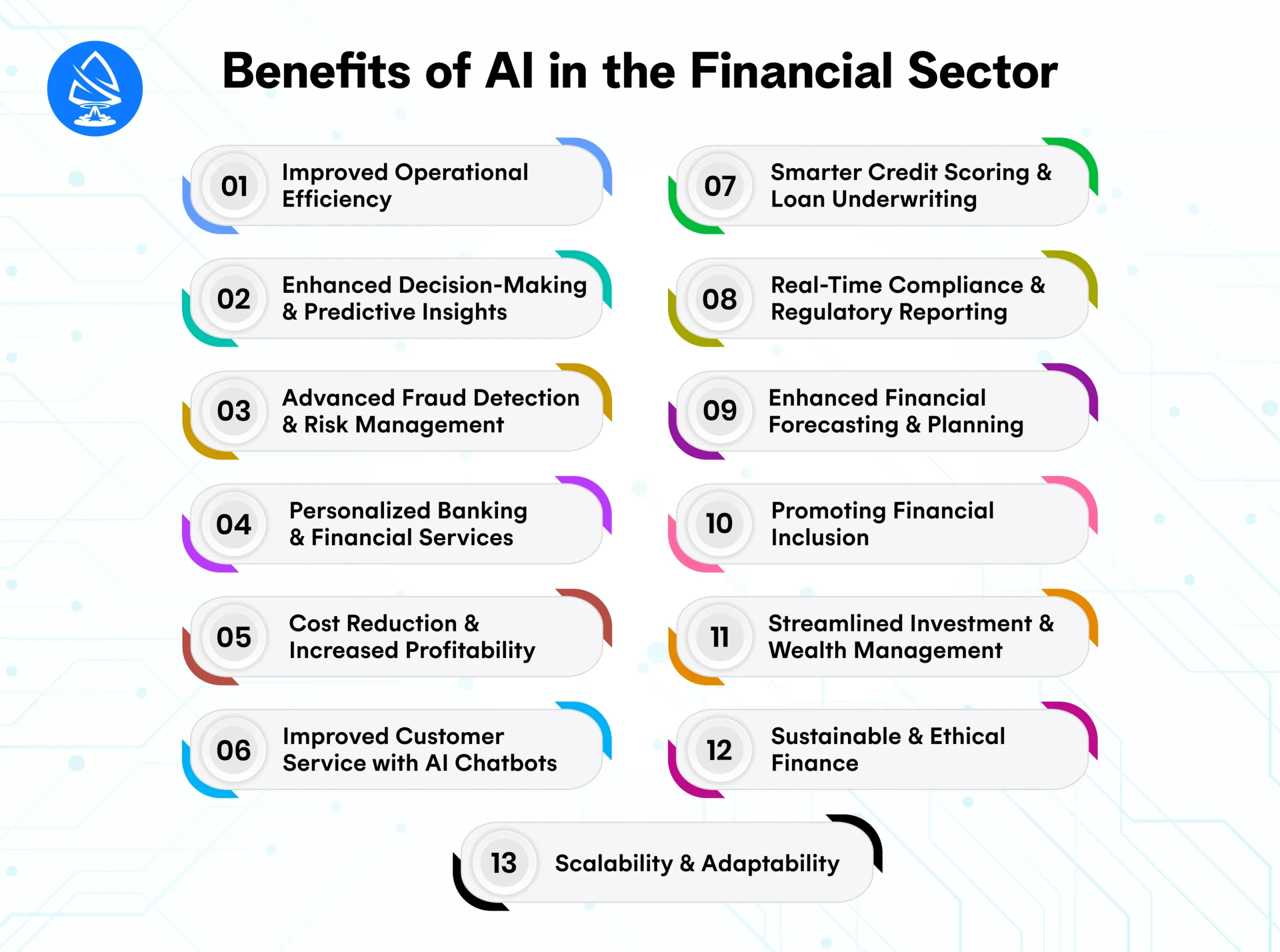Synthetic Intelligence (AI) is revolutionizing the monetary sector, reshaping how banks, funding companies, and monetary establishments function, handle dangers, and serve their prospects. From automated credit score scoring to fraud detection and customized monetary planning, AI in finance is driving effectivity, safety, and innovation like by no means earlier than.
By 2030, AI is projected to contribute over $1.2 trillion yearly to the banking and monetary companies business (BFSI). The know-how is not only optimizing current processes; it’s redefining the very nature of banking by empowering data-driven decision-making, real-time threat administration, and hyper-personalized buyer experiences.
On this weblog, we’ll discover the affect of AI within the monetary sector banking, its purposes, advantages, challenges, and future potential, serving to companies and professionals perceive why adopting AI is not a alternative however a necessity.
What’s AI in Monetary Providers?
Synthetic Intelligence (AI) in monetary companies refers back to the integration of clever applied sciences resembling machine studying (ML), pure language processing (NLP), deep studying, and predictive analytics into banking, funding, insurance coverage, and monetary administration programs. The aim is to allow monetary establishments to automate operations, detect fraud, handle threat, improve decision-making, and supply customized buyer experiences.
AI acts as a digital mind that repeatedly learns from large quantities of economic information, identifies patterns, and makes predictions or choices with out direct human intervention. In essence, it permits banks and monetary firms to course of data quicker, make smarter strategic decisions, and serve prospects extra effectively.
Core Definition and Function
At its core, AI in monetary companies is about utilizing clever programs to carry out duties that historically required human intelligence, resembling analyzing advanced information, assessing dangers, recognizing anomalies, and speaking with prospects.
The monetary business operates on information, precision, and belief, and AI amplifies all three by introducing automation, accuracy, and predictive capabilities.
Function of AI in Finance:
- Automation: Streamline repetitive handbook duties like information entry, compliance reporting, and transaction verification.
- Evaluation: Determine insights and developments from huge, unstructured monetary information.
- Prediction: Forecast market actions, credit score dangers, and funding alternatives.
- Determination-making: Help human analysts with quicker, data-backed suggestions.
- Buyer Engagement: Ship customized companies via AI-driven chatbots and advisors.
Core Elements of AI in Monetary Providers
AI within the monetary sector combines a number of applied sciences working collectively to create clever, scalable programs.

1. Machine Studying (ML):
Machine studying fashions study from historic monetary information and enhance choice accuracy over time.
- Utilized in credit score scoring, market development evaluation, and portfolio optimization.
- Instance: Predicting mortgage defaults primarily based on previous borrower habits and macroeconomic situations.
2. Pure Language Processing (NLP):
NLP permits AI programs to grasp and reply to human language.
- Powers chatbots, voice assistants, and automatic report technology.
- Instance: AI chatbots answering buyer questions on account balances or mortgage eligibility.
3. Deep Studying:
Deep studying makes use of neural networks to course of advanced monetary information resembling pictures, voice, and textual content.
- Allows superior fraud detection and doc verification.
- Instance: AI programs detecting solid signatures or doc tampering throughout KYC processes.
4. Predictive Analytics:
Predictive analytics makes use of AI fashions to forecast future outcomes primarily based on information developments.
- Helps in inventory market prediction, buyer habits evaluation, and enterprise planning.
- Instance: AI predicting a buyer’s probability to speculate primarily based on revenue and spending patterns.
5. Robotic Course of Automation (RPA):
RPA automates repetitive, rule-based duties like type processing or information migration.
- Utilized in compliance, claims administration, and reconciliation.
- Instance: Automating back-office duties like transaction verification or report submitting.
The Rising Significance of AI within the Monetary Sector
The monetary business is without doubt one of the earliest and most enthusiastic adopters of AI. The mixing of AI in finance is pushed by three main wants: effectivity, accuracy, and belief.
Key Drivers Behind AI Development in Banking and Finance:
- Knowledge Explosion: With trillions of transactions occurring day by day, solely AI can course of and interpret information at scale.
- Buyer Expectations: Shoppers anticipate quicker, extra customized, and safe digital monetary experiences.
- Regulatory Stress: AI helps guarantee compliance via real-time monitoring and anomaly detection.
- Competitors: FinTech startups leveraging AI push conventional banks to modernize.
Stat Snapshot:
- Over 80% of economic establishments have adopted AI in a minimum of one enterprise space.
- The AI within the banking market is anticipated to surpass $130 billion by 2030.
Functions of AI within the Monetary Sector Banking
AI has numerous real-world purposes in banking and finance. Let’s discover essentially the most impactful ones which might be reshaping the business.

1. Fraud Detection and Prevention
Fraud stays a major menace in monetary companies, however AI algorithms have drastically improved detection accuracy and response occasions.
- AI analyzes billions of transactions in actual time to determine uncommon spending patterns or location mismatches.
- Predictive analytics spot rising fraud developments earlier than they unfold.
- Behavioral biometrics screens how customers work together with apps to detect impostors.
Instance: Mastercard’s Determination Intelligence AI analyzes every transaction’s context, quantity, location, and buyer historical past to evaluate fraud chance in milliseconds.
Influence: Lowered false positives, improved safety, and enhanced buyer belief.
2. Credit score Scoring and Threat Evaluation
Conventional credit score scoring fashions rely closely on static monetary information, however AI-driven credit score scoring makes use of dynamic variables like transaction historical past, social habits, and real-time revenue information.
- AI fashions consider creditworthiness quicker and extra precisely.
- Unbanked populations acquire entry to loans via various information fashions.
- Threat profiles adapt robotically as monetary situations change.
Instance: Upstart, an AI-powered lending platform, makes use of over 1,600 information factors for credit score analysis, decreasing mortgage default charges by 75%.
Influence: Fairer lending practices and broader monetary inclusion.
3. Customized Monetary Providers
AI allows hyper-personalization, tailoring services and products to every buyer’s distinctive monetary profile.
- Banks use AI to advocate funding portfolios primarily based on spending habits.
- AI chatbots present personalized monetary recommendation 24/7.
- Predictive analytics helps prospects plan for financial savings or retirement.
Instance: Financial institution of America’s Erica AI assistant has dealt with over 1 billion buyer interactions, providing customized ideas and monetary updates.
Influence: Stronger buyer relationships and improved satisfaction charges.
4. Algorithmic and Automated Buying and selling
In funding banking, AI’s predictive energy revolutionizes buying and selling and portfolio administration.
- Machine studying fashions analyze real-time market information to foretell worth fluctuations.
- AI bots execute trades at optimum occasions, maximizing earnings.
- Threat administration programs adapt immediately to market volatility.
Instance: Goldman Sachs makes use of AI-driven algorithms for predictive buying and selling, serving to analysts course of large datasets quicker than human groups ever might.
Influence: Knowledge-backed funding methods and lowered human error in buying and selling choices.
5. Regulatory Compliance and Anti-Cash Laundering (AML)
Regulatory compliance is without doubt one of the costliest and time-consuming areas of finance. AI automates compliance monitoring, decreasing each value and error.
- AI scans transactions for AML dangers and generates compliance stories robotically.
- NLP helps establishments interpret regulatory texts and replace insurance policies in actual time.
- Machine studying fashions detect suspicious transaction patterns that evade rule-based programs.
Instance: HSBC makes use of AI and machine studying to watch billions of transactions for potential money-laundering actions.
Influence: Lowered compliance burden and enhanced transparency.
6. Buyer Service and Digital Assistants
AI-driven chatbots and voice assistants are redefining buyer engagement in banking.
- Digital brokers present real-time solutions about stability, loans, or investments.
- NLP permits clean conversations throughout a number of languages and channels.
- Sentiment evaluation detects buyer frustration and escalates advanced points.
Instance: Capital One’s Eno chatbot handles 70% of buyer queries immediately, decreasing name middle load dramatically.
Influence: 24/7 help availability and improved service effectivity.
7. Monetary Forecasting and Analytics
AI excels at forecasting monetary developments, enabling smarter enterprise choices.
- Predictive fashions analyze market situations, rates of interest, and historic information.
- Banks use AI analytics for budgeting, money stream prediction, and asset administration.
- AI helps monetary planners anticipate consumer wants and optimize portfolios.
Instance: Morgan Stanley’s Subsequent Greatest Motion AI software offers advisors with real-time insights to assist shoppers make knowledgeable funding choices.
Influence: Knowledgeable decision-making and improved return on funding.
8. Insurance coverage and Claims Administration
AI is reworking InsurTech, bettering claims dealing with, underwriting, and buyer onboarding.
- AI chatbots course of claims quicker by verifying information immediately.
- Predictive analytics assist insurers calculate truthful premiums.
- AI fraud detection prevents false insurance coverage claims.
Instance: Lemonade Insurance coverage makes use of AI to approve 30% of claims immediately, chopping operational prices and boosting buyer satisfaction.
Influence: Environment friendly claims processing and lowered fraud losses.
Advantages of AI within the Monetary Sector
The monetary sector is without doubt one of the largest beneficiaries of synthetic intelligence (AI) innovation. With the explosion of knowledge, growing competitors, and rising buyer expectations, banks, insurance coverage firms, and funding companies are leveraging AI to streamline operations, improve decision-making, mitigate dangers, and ship customized experiences.
AI’s affect on the monetary sector extends far past automation; it empowers establishments to function intelligently, adapt to real-time adjustments, and anticipate future market developments. Beneath, we discover intimately the important thing advantages of AI within the monetary sector which might be reworking how the business capabilities.

1. Improved Operational Effectivity
One of the vital fast advantages of AI in finance is course of automation. Monetary establishments deal with tens of millions of transactions day by day, lots of which contain repetitive, rule-based duties.
- AI and Robotic Course of Automation (RPA) remove handbook operations like information entry, KYC verification, and compliance documentation.
- These programs can work 24/7 with out fatigue, decreasing errors and rushing up process completion.
- AI additionally automates reconciliation, claims processing, and report technology, liberating staff to give attention to strategic duties.
Instance: JPMorgan’s COiN (Contract Intelligence) system automates doc assessment, saving the corporate over 360,000 hours yearly.
Key Influence:
- Reduces human workload.
- Cuts operational prices.
- Enhances productiveness and accuracy throughout departments.
2. Enhanced Determination-Making and Predictive Insights
In finance, each choice from approving a mortgage to executing a commerce will depend on correct information evaluation. AI offers real-time insights and predictive analytics that empower quicker, data-driven choices.
- AI fashions can analyze historic developments, market fluctuations, and buyer information to forecast future outcomes.
- Predictive analytics determine alternatives or dangers in investments, lending, and credit score scoring.
- Machine studying algorithms repeatedly enhance accuracy as they course of extra information.
Instance: Funding companies use AI-driven analytics to foretell market actions and determine worthwhile buying and selling alternatives in actual time.
Key Influence:
- Allows higher forecasting and planning.
- Reduces human bias in monetary evaluation.
- Strengthens competitiveness via data-backed intelligence.
3. Superior Fraud Detection and Threat Administration
Fraud is a significant concern within the monetary business. Conventional strategies typically react after a breach, whereas AI programs detect anomalies in actual time, stopping fraud earlier than it occurs.
- AI makes use of sample recognition and behavioral analytics to detect irregular actions throughout tens of millions of transactions.
- ML fashions can study what constitutes “regular” habits for every person and flag deviations immediately.
- AI improves threat evaluation by analyzing buyer credit score histories, spending habits, and reimbursement developments.
Instance: Mastercard’s Determination Intelligence makes use of AI to research transaction patterns in milliseconds, decreasing false declines and detecting suspicious exercise immediately.
Key Influence:
- Strengthens cybersecurity and belief.
- Reduces monetary losses resulting from fraud.
- Enhances regulatory compliance with correct reporting.
4. Customized Banking and Monetary Providers
Clients at present anticipate customized and handy monetary experiences, just like these supplied by e-commerce platforms. AI allows hyper-personalization by analyzing buyer information, preferences, and habits.
- AI-driven advice engines counsel monetary merchandise, loans, or funding choices tailor-made to every person.
- Digital assistants present real-time recommendation, price range administration, and financial savings ideas.
- Sentiment evaluation identifies buyer feelings to enhance engagement.
Instance: Financial institution of America’s Erica, an AI-powered digital assistant, helps prospects verify balances, monitor transactions, and obtain spending insights, all personalized to particular person monetary habits.
Key Influence:
- Builds stronger buyer loyalty.
- Improves satisfaction via customized experiences.
- Boosts income by way of cross-selling and upselling alternatives.
5. Price Discount and Elevated Profitability
AI-driven automation considerably lowers operational prices whereas bettering effectivity throughout enterprise capabilities.
- By eliminating handbook duties and human error, monetary establishments save tens of millions yearly.
- AI instruments cut back prices related to compliance, buyer help, and fraud administration.
- Predictive fashions optimize investments, bettering return on property.
Instance: AI chatbots deal with 1000’s of buyer queries at a fraction of the price of conventional name facilities.
Key Influence:
- Decrease administrative and operational bills.
- Elevated margins resulting from higher useful resource utilization.
- Enhanced profitability via optimized efficiency.
6. Improved Buyer Service with AI Chatbots
AI chatbots and digital assistants have develop into the frontline of buyer interplay in trendy banking. They provide instantaneous, 24/7 help, bettering accessibility and satisfaction.
- Chatbots deal with routine queries resembling account balances, mortgage standing, or card points.
- They cut back response occasions and route advanced points to human brokers when wanted.
- NLP-based AI programs perceive pure language, permitting seamless, human-like conversations.
Instance: Capital One’s chatbot Eno handles over 70% of fundamental buyer requests immediately, decreasing the strain on customer support groups.
Key Influence:
- 24/7 help availability.
- Lowered ready occasions for patrons.
- Enhanced buyer expertise via fast drawback decision.
7. Smarter Credit score Scoring and Mortgage Underwriting
Conventional credit score scoring strategies typically depend on restricted historic information, overlooking deserving debtors. AI revolutionizes this by analyzing non-traditional information factors, providing a extra correct threat profile.
- AI fashions consider elements like spending patterns, cell cost habits, and even social alerts.
- Machine studying repeatedly refines creditworthiness fashions to enhance accuracy.
- Monetary establishments can serve underbanked populations, growing inclusion.
Instance: FinTech platform Upstart makes use of AI to evaluate credit score threat, decreasing mortgage default charges by as much as 75% and approving extra certified candidates.
Key Influence:
- Fairer lending practices.
- Expanded entry to monetary merchandise.
- Lowered non-performing loans and default charges.
8. Actual-Time Compliance and Regulatory Reporting
The monetary business operates beneath strict rules, and compliance administration is each advanced and dear. AI simplifies this by automating regulatory monitoring, information assortment, and report technology.
- NLP programs can interpret new rules and replace compliance frameworks robotically.
- AI detects potential non-compliance dangers and flags them early.
- Automated audits and transaction tracing guarantee transparency.
Instance: HSBC makes use of AI-powered AML (Anti-Cash Laundering) instruments to detect suspicious patterns, bettering compliance accuracy and decreasing handbook intervention.
Key Influence:
- Sooner, error-free compliance processes.
- Lowered regulatory fines and penalties.
- Improved transparency and accountability.
9. Enhanced Monetary Forecasting and Planning
AI’s capacity to course of large information units in actual time allows correct monetary forecasting and long-term planning.
- AI instruments analyze market information, buyer developments, and macroeconomic indicators to forecast income and threat.
- Banks use predictive analytics for liquidity administration, funding methods, and portfolio optimization.
- CFOs and monetary planners depend on AI dashboards for situation planning.
Instance: Morgan Stanley’s Subsequent Greatest Motion AI offers advisors with data-driven insights to information shoppers on investments and portfolio changes.
Key Influence:
- Extra dependable monetary predictions.
- Improved strategic planning and capital allocation.
- Proactive, data-backed decision-making.
10. Selling Monetary Inclusion
AI performs a vital position in extending monetary companies to unbanked and underbanked populations around the globe.
- AI-powered cell banking platforms use various information for credit score evaluation.
- Chatbots and multilingual AI programs make monetary companies accessible in native languages.
- Predictive fashions assist microfinance establishments handle threat and scale sustainably.
Instance: FinTech startups in Africa and Asia use AI to approve microloans for people with no formal banking historical past, driving inclusion.
Key Influence:
- Democratization of banking companies.
- Financial empowerment of underserved communities.
- International growth of economic ecosystems.
11. Streamlined Funding and Wealth Administration
AI-powered robo-advisors are altering how individuals make investments and handle wealth.
- Robo-advisors use algorithms to advocate funding portfolios primarily based on threat tolerance and monetary targets.
- They rebalance portfolios robotically to take care of optimum efficiency.
- AI offers buyers with real-time insights and alerts on market shifts.
Instance: Platforms like Wealthfront and Betterment use AI to handle portfolios for tens of millions of customers, providing personalized funding recommendation with minimal charges.
Key Influence:
- Democratization of wealth administration.
- Constant and emotion-free funding choices.
- Decrease prices in comparison with human monetary advisors.
12. Sustainable and Moral Finance
AI contributes to sustainable finance by serving to establishments monitor and consider the environmental and social affect of investments.
- AI analyzes ESG information to evaluate sustainability efficiency.
- Predictive fashions consider dangers in environmentally delicate tasks.
- Monetary organizations use AI to construct inexperienced funding methods aligned with international sustainability targets.
Instance: BlackRock makes use of AI to guage ESG information factors for accountable investing, guaranteeing alignment with sustainability ideas.
Key Influence:
- Promotes moral and sustainable enterprise practices.
- Enhances model repute and investor belief.
13. Scalability and Adaptability
AI allows monetary establishments to scale operations effortlessly. Whether or not dealing with one million transactions or launching in a brand new market, AI’s automation and cloud integration make scaling seamless.
- AI programs deal with peak demand intervals with out efficiency dips.
- Cloud-based AI platforms guarantee flexibility for distant operations.
- AI evolves repeatedly via information studying, staying related with market developments.
Key Influence:
- Scalable enterprise progress.
- Improved adaptability in altering market situations.
- Lengthy-term sustainability and resilience.
Challenges of AI Adoption in Finance
Regardless of its potential, AI in finance faces hurdles:
- Knowledge Privateness Issues: Delicate monetary information requires strict governance to forestall misuse.
- Algorithmic Bias: Poorly educated fashions could make unfair choices.
- Integration Complexity: Legacy programs are sometimes incompatible with new AI fashions.
- Regulatory Compliance: Adhering to evolving legal guidelines like GDPR and CCPA is difficult.
- Excessive Implementation Prices: Smaller establishments could lack sources for AI infrastructure.
- Talent Gaps: There’s a scarcity of AI professionals educated in monetary purposes.
Answer: Partnering with an professional AI app growth firm in USA helps monetary organizations overcome these challenges with scalable, compliant, and customised options.
Way forward for AI within the Monetary Sector Banking
By 2030, AI might be on the core of economic ecosystems, powering all the things from buyer onboarding to wealth administration.
Predicted Developments:
- AI-Pushed Autonomous Banking: Absolutely automated monetary transactions with minimal human enter.
- Quantum AI: Quantum computing will improve real-time analytics for funding and threat modeling.
- Generative AI for Finance: AI brokers will generate predictive fashions, stories, and customized funding methods.
- Moral and Accountable AI: Concentrate on clear and unbiased decision-making in lending and compliance.
Outlook: Monetary establishments that spend money on AI at present won’t solely enhance efficiency but additionally acquire a sustainable aggressive edge within the quickly evolving digital economic system.
Conclusion
The affect of AI within the monetary sector is nothing in need of transformative. By combining automation, predictive analytics, and customized companies, AI empowers monetary establishments to function smarter, quicker, and safer. As we transfer towards 2030, AI will redefine how banking works, from decision-making to buyer engagement and compliance.
The way forward for finance is AI-driven, data-powered, and customer-focused. Companies that embrace this transformation now will set themselves aside in an more and more aggressive international market.
Prepared to rework your monetary operations with AI? Use our AI App Price Calculator to estimate your funding and collaborate with a number one AI app growth firm in USA to construct safe, clever, and future-ready monetary options.
Continuously Requested Questions
1. How is AI reworking the monetary sector?
AI automates duties, enhances fraud detection, and delivers customized monetary companies via superior analytics.
2. What are widespread AI purposes in banking?
Credit score scoring, customer support chatbots, threat administration, and algorithmic buying and selling are main use instances.
3. Can small banks undertake AI options?
Sure. Cloud-based AI instruments and growth companions make adoption reasonably priced for smaller establishments.
4. How does AI stop monetary fraud?
AI detects anomalies in transactions and person habits to determine and cease fraudulent exercise immediately.
5. What are the principle challenges of AI in finance?
Knowledge privateness, algorithm bias, excessive prices, and integration with legacy programs.
6. Will AI change human bankers?
No. AI augments human decision-making, enabling workers to give attention to higher-value strategic roles.
7. What’s the way forward for AI in banking?
AI will allow absolutely autonomous, data-driven, and customer-centric monetary ecosystems.
8. How can companies begin with AI in finance?
Companion with a trusted AI app developer or AI app growth firm in USA to create scalable, compliant monetary AI options.




